

The Springbok tour in the Manawatu. New Zealand Geographic. The opening ceremony of the Montreal Olympics was televised live in New Zealand from 7 am on Sunday, July 18, 1976, and those New Zealanders who rose early to watch turned on their set with some trepidation.
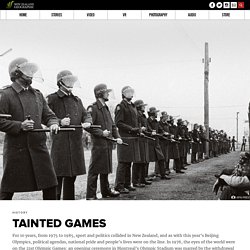
The national teams marched through and symphonic music sounded across a stadium crammed with 75,000 people. Then came the ringing vowels of Queen Elizabeth in her Hardy Amies pink suit and hat, declaring open the 21st Olympiad of the modern era. Two young athletes, one French and one English—to reflect a bicultural Canadian nation—entered the stadium and together ran the Olympic torch around the track. The two runners then moved to the grassed centre of the stadium.
Springbok Rugby Tour 1981. In 1981 the South African rugby team, the Springboks came to tour New Zealand.
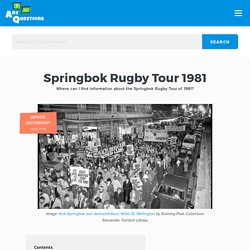
They had toured before, but the South African apartheid system was causing an increasing public outcry in New Zealand. Things came to a head in 1981, with New Zealanders fiercely divided over whether the Springbok tour should go ahead. There were numerous protests at rugby games around the country and some violent encounters between the pro-tour and anti-tour movements. The night of the batons: still defiant 30 years on. The veterans of the 1981 Springbok tour protests are still proud of having stood up for something they believed in, despite their scars.
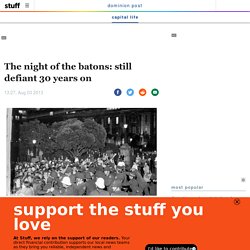
Tom Hunt reports. For 32 years, the hair hasn't grown from the scar on Karen Brough's temple. It's a brutal reminder of the evening of July 29, 1981, when she was at the front of 2000 anti-apartheid protesters who came up against baton-wielding police in Molesworth St, outside Parliament. The 16-year-old Wellington High School pupil was hit in the head with a baton, knocked to the ground, then hit on the back and arms. Springbok tour myths remain. It's no exaggeration to say that for some of my generation the 1981 Springbok tour was as much the defining event of their lives as the 1939-45 war had been for their parents.
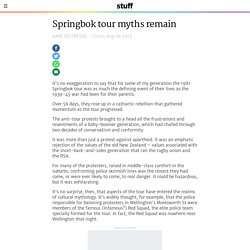
Over 56 days, they rose up in a cathartic rebellion that gathered momentum as the tour progressed. The anti-tour protests brought to a head all the frustrations and resentments of a baby-boomer generation, which had chafed through two decades of conservatism and conformity. It was more than just a protest against apartheid. 1981 Springbok Tour - Poster Collection - Heritage.
The Springbok Tour Of 1981 – 25 Years On. SOUTH AFRICAN CONSULATEWELLINGTON (NZ)Gregory FortuinHonorary Consul for the Republic of South Africa Wednesday 19 July 2006.
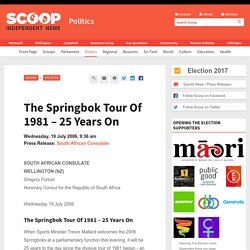
The Springbok Tour Of 1981 – 25 Years On When Sports Minister Trevor Mallard welcomes the 2006 Springboks at a parliamentary function this evening, it will be 25 years to the day since the divisive tour of 1981 began - an event that set mate against mate and divided a nation. The class of 2006 is in New Zealand with the blessing of the nation ranging from Nelson Mandela to the vagrants in the subway of Cape Town station.
Springbok Tour 1981. Introduction "A woman show signs of battle after protesters and red squad police clashed at the Luxford Street-Rintoul Street intersection during anti Springbok tour demonstrations in Wellington, 1981.
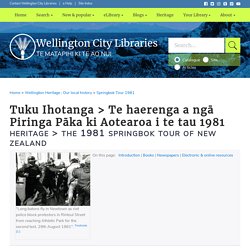
" Footnote [3.] Springbok Rugby Tour papers - Documentary Archives - Macmillan Brown Library - University of Canterbury. Collection Summary Title: Springbok Rugby Tour papers Creator: University of Canterbury Dates: 1981 - Unknown Description: At the conclusion of the Springbok's Rugby tour of New Zealand in July-September 1981 members of the English Department of the University of Canterbury placed advertisements in a number of newspapers and periodicals throughout New Zealand asking for people's comments and experiences.
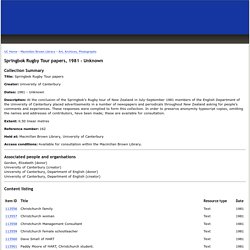
Release of NZSIS Reports on 1981 Springbok Rugby Tour Protests. Release of NZSIS Reports on 1981 Springbok Rugby Tour Protests 21 December 2011 This year marks the 30th Anniversary of the 1981 Springbok rugby tour of New Zealand.
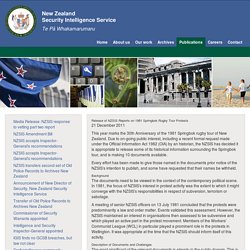
John Selkirk Photography. A protester readys herself at Fowlds Park before the march to Eden Park the scene of the 3rd NZ v Springbok test. 1981 Police and anti tour protesters clash during the battle of Onslow Rd, outside Eden Park third Springbok test 1981 After the battle of Walters Rd, a small boy paints a peace sign.
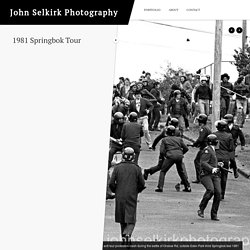
Third Springbok test, Eden Park 1981 Lancaster Park fortress before the 2nd Springbok test 1981 Anti tour protesters had their own first Aid after the battle of Walters Rd. 3rd Springbok test Eden park 1981 Pro and anti tour factions meet before the game outside Eden Park the venue of the 3rd NZ v Springbok test Anti tour protesters pull the fence down at Rugby Park, Hamilton before invading the pitch causing the Waikato v Springboks game cancelled. 1981 Protesters outside Eden Park where the 3rd tst was being played salute the plane that was flour bombing the players. 1981 Waikato match. Greater even than Rugby - the 1981 Springbok Tour. This year marks the 25th Anniversary of the 1981 Springbok tour.
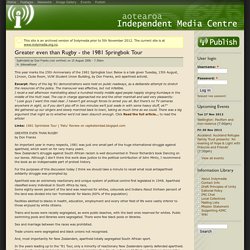
Below is a talk given Tuesday, 15th August, 12noon, Clubs Room, VUW Student Union Building, by Don Franks, anti apartheid activist. Excerpt: Many of the big ’81 demonstrations were held on public roadways, as a deliberate attempt to stretch the resources of the police. The manouver was effective, but not infallible. DigitalNZ Beta. Topic Explorer for Schools. Inside the 1981 Springbok tour - The Listener. Thirty years after the 1981 Springbok rugby tour, Police have given the Listener access to previously classified documents. Looking back, the violence of a secret police training session was an indication of what was to come. It was June 1981. Six weeks before the arrival of the Springbok rugby team, elite riot police drilled at Papakura Army Base.
They faced off against 70 chanting soldiers who were stand-in protesters. According to a trove of long-restricted police files released to the Listener, three police required medical treatment for injuries after the training drill. Protests the start of the end of apartheid. Norman Kirk called staff and media into his third-floor office at Parliament 40 years ago to say something you'd be unlikely to hear a prime minister say today. The short statement, said his private secretary Margaret Hayward, who was there on April 10, 1973, amounted to the prime minister admitting: "I was wrong.
" He also said he was embarrassed, and knew he would be criticised. He said, 40 years ago this week, that a white-only South African rugby team would have an invitation to tour New Zealand withdrawn by the rugby union.